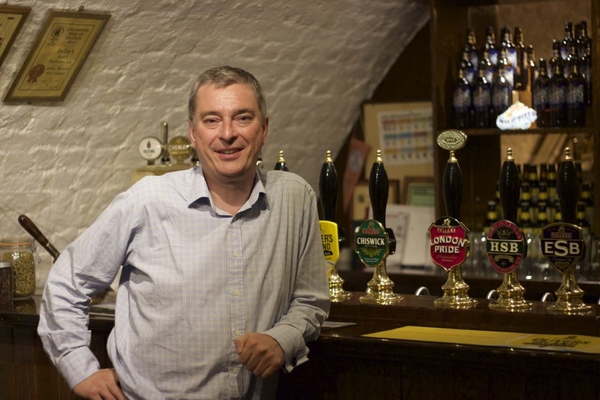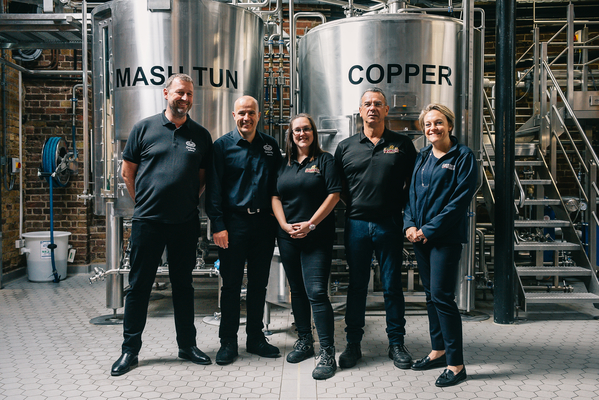Master brewer's mission to boost cask
Added: Tuesday, October 30th 2018

John Keeling has a mission in life – to revive the fortunes of cask beer. John is Fuller’s former head brewer and now the company’s beer ambassador. He retired in September after 37 years with the Chiswick brewery but his love of real ale is undimmed and he’s disturbed by its fall from grace.
“Sales of cask are falling by 10 per cent a year,” he says, “while keg is up 20 per cent. Young drinkers see keg as more consistent.
“Cask is going backwards. It should be the centre of a vibrant pub scene but no one is making money from it and quality is suffering. There are plenty of beers on the bar but in too many cases they are being served after seven days when cask should never be sold after three days.”
John has travelled widely in his work – he judged at the Great American Beer Festival in Denver in September – and he has tasted many fine beers, both ales and lagers. Nevertheless he thinks when cask beer is properly cellared and served it is unbeatable – but all too often these days it’s not properly looked after.
Fuller’s has put a lot of time, effort and money into ensuring that the likes of London Pride are always in tip-top condition in the brewery’s 370 pubs. But the number of brewers with tied estates has fallen dramatically and publicans are no longer trained in cellar skills by many modern pub companies.
“We need to bring back trade quality surveyors to train publicans,” John says. “If they serve cask beer after four days, then breweries should stop supplying them.
“CAMRA should run three-day training courses for its members. They would get a certificate and be able to report pubs that serve poor cask beer.”
All beer was once cask beer, he adds, but today it’s a unique British product. American brewers would love to make cask but they are stopped as a result of a distribution system dominated by giant national brewers and lack of pub cellars.
“But when an American brewer comes to England and phones me, he wants to go to a pub for a pint of London Pride!” he laughs.
John Keeling is convinced the industry and consumers need to go beyond merely calling for cuts in beer duty but should demand root-and-branch change that will allow cask beer to flourish again.
“For a start, we need to turn cask into a premium product,” he says. “There are premium lagers and ciders but hardly any premium cask beers.
“Breweries need to invest in pins [4½ gallon casks] and put premium ale into them. We need new quality guidelines: cask can only be served for two days when a cask is broached and it should be cool at 10 degrees.”
John’s most audacious suggestion is for a new tax band for cask beer to underpin its unique method of production and its historic role in British life.
“We need either a 20 per cent reduction in duty on cask or a reduction in cask duty to the same level as cider. At the moment there’s a 20 pence difference in price between cask and cider but why should cider be taxed differently? A 20 per cent reduction in duty on cask beer would give it a 20 pence greater margin.”
He strengthens the argument by checking the price list in the Mawson Arms, Fuller’s brewery tap in Chiswick:
•London Pride, 4.1%, £4.25 a pint.
•Foster’s 4%, £4.30 a pint.
•Guinness 4.1%, £4.80 a pint.
•Carlsberg Export 4.3%, £4.85 a pint.
•Cornish Gold Cider, 4.5%, £5.40 a pint.
A nationwide survey in December 2017 found the following prices:
•Keg ales (excluding craft) £2.92 a pint.
•Standard lager £3.20 a pint.
•Standard cider £3.28 a pint.
•Cask beer £3.34 a pint.
•Stout £3.73 a pint.
•Premium lager £3.90 a pint.
•Premium cider £4.02 a pint.
•Craft keg £4.09 a pint.
John says that cask is not treated as a premium product while the margin on non-cask beer and cider is bigger.
“The government makes more money out of cask beer than any other party, brewers or retailers – so why can’t we have duty relief on cask beer, which would be recovered by greater sales?
“Cask beer at 4.1 per cent ABV pays £78.22 duty per hectolitre, cider at 4.1 per cent pays £30.38 per hectolitre. There are roughly 176 pints in a hectolitre so that becomes 44 pence per pint for beer and 22 pence per pint for cider.”
There’s a political element to John’s suggestions. He points out that the changes he advocates to duty rates would be illegal under European Union regulations but Britain will be free to set its own rates when we leave the union.
“We’ve got to make cask beer sexy – put the oomph back,” he says. “Brexit will give us the opportunity.”
He lavishes praise on the beer style he loves. “Cask is subtle – you need to drink several pints to appreciate it, whereas you know you like a keg beer after a few sips.”
John Keeling may be retiring but he’s not giving up on beer. He will act as a consultant to Fuller’s and plans his own consultancy agency, Think It Brew. High on his agenda is a beer summit early next year that he hopes will attract CAMRA, SIBA, Cask Marque and brewers to plan a programme to revitalise the cask beer sector.
Don’t go away.
•One of John’s last jobs at Fuller’s was to oversee the installation of a 10-barrel pilot plant that now stands at the back of the brewery shop. Visitors can see beers being brewed that will be new products which will be put on trial in Fuller’s pubs: those that are successful with the public will move to the main brewery. Collaboration beers will also be produed on the new plant.
•Fuller Smith & Turner, Griffin Brewery, Chiswick Lane South, London W4. www.fullers.co.uk
Pictured below the new pilot plant at Fuller's with John Keeling succesor Georgina Young on the right.










